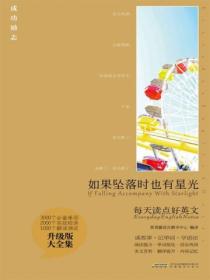向自己要时间 How to Find Time
戴尔·特纳/Dale Turner
A commercial flashing on our TV screens these days shows men and women trying to buy a bit of time. It catches the plight of most of us in our hurry-scurry world. “I don't want a 40-hour week,”says Nicholas Murray Butler, former president of Columbia University, “I want a 40-hour day.”
I never cease to marvel at how some people, working with the same number of hours we all have, seem to get so much more done. How do they do it?
For one thing, they, don't squander the bits and pieces of time that punctuate our days. Rather than wasting energy getting irritated waiting for a phone call or a repair person, they capture those moments creatively. They keep tools handy—a pen, a book, a pair of scissors, a needle, whatever.
Clement C. Moore was a teacher of classical languages. In the course of his career, he published a Hebrew dictionary and was a major benefactor of the General Theological Seminary in New York City.
But it is not for the seminary or his dictionary that he is remembered. It is for a set of verses dashed off in 1822 in an hour of yuletide inspiration—verses that he stuffed away as if of no importance.
The magic lines begin: “It was the night before Christmas, when all through the house……”They never brought Moore a penny, but they did bring him immortality.
Such constructive use of time is available to us all. A Seattle businessman carries a briefcase in which he has paper and envelopes for penning letters. In odd moments he keeps countless friendships alive.
A woman I know memorized the sermon on the Mount while commuting. A bedspread in our home was quilted by my mother-in-law who, though extremely busy, found minutes to prepare a beautiful gift full of memories for her family.
Remember, most time is wasted in minutes, not hours. The average person diddles away enough minutes in ten years to have earned a college degree.
Thinking of this reminds me of a verse from my childhood by Julia Fletcher Carney:
Little drops of water,
Little grains of sand,
Make the mighty ocean,
And the pleasant land.
Do you recall the next four lines?
So the little minutes,
Humble though they be,
Make the mighty ages
Of eternity.
近来,我们的电视机屏幕上常常出现这样一则广告:男男女女都在争取买一点时间。它真实地刻画了我们这个慌乱世界的大部分人的境况。“我不要40小时的一周,”哥伦比亚大学前校长尼古拉斯·默里·巴特勒说,“我想要40小时的一天。”
一些人和我们工作的时间一样长,然而成就却似乎比我们的要大得多,对此我一直很好奇。他们是如何做到的呢?
第一,他们从不浪费那些时常打断我们生活的点滴的时间。他们不是把时间浪费在等电话或对修理工的愤怒上,而是充满创造性地抓住那些星星点点的时间。他们手头总有各式各样的工具——一支钢笔,一本书,一把剪刀或一根针。
克莱门特·C.莫尔是古典语老师。执教期间,他出版了一部希伯来语词典,与此同时,他还是纽约市综合神学院的主要捐助者。
然而,他被人们怀念的原因并不是神学院或是他的词典,而是1822年他在圣诞节期间灵光乍现时匆忙间一挥而就的一组诗文——他随手把它们塞到一旁,仿佛无关紧要。
魔术般的诗篇是这样开始的:“那是圣诞前夜,整所房子里……”诗文从未给莫尔带来一分钱,然而它们的确给他带来了不朽的声望。
对我们而言,很多有关时间使用的建议我们都是能够做到的。西雅图有一位实业家总会带着一个装有信纸和信封的公事包,利用无数零星的时间,他与众多友人保持着联系。
比如,我认识的一位妇女利用上下班的乘车时间背诵《圣经》中的“登山宝训”。比如,我们家的一条床罩是岳母亲手缝制的,尽管每天都很忙,她还是利用分分秒秒为家人准备了一件充满纪念意义的漂亮礼物。
谨记,大多数时间都是以分为单位而不是以小时为单位浪费掉的。普通人在10年的时间里浪费的分分秒秒加起来足以让他拥有一个大学学位。
想到这里,我想起了小时候学到的朱莉娅·弗莱彻·卡尼的一个诗节:
小小水滴,
汇流成海;
细细沙粒,
聚为良田。
你是否记得接下来的四行呢?
一分一秒,
本不起眼;
积年成代,
成就非凡。
词汇笔记
screen [skri:n] n. 卡位;屏幕
例 She looks much younger than on the screen.
她看上去要比在银幕上更年轻。
punctuate [?p??ktjueit] v. 不时打断;强调;加标点于
例 His speech has been punctuated by cheering.
他的演讲不停地被欢呼声打断。
yuletide [?ju:ltaid] adj. 圣诞节期的
例 Everything which happens during Yuletide follows from states of mind.
在圣诞时节发生的每件事都来自于一种心情。
average [??v?rid?] adj. 平均的;普通的
例 Rainfall is about average for the time of year.
对一年中的这个时候来说,降雨量还算普通。
小试身手
一些人和我们工作的时间一样长,然而成就却似乎比我们的要大得多,对此我一直很好奇。
译_______________
他们从不浪费那些时常打断我们生活的点滴的时间。
译_______________
谨记,大多数时间都是以分为单位而不是以小时为单位浪费掉的。
译_______________
短语家族
I never cease to marvel at how some people, working with the same number of hours we all have, seem to get so much more done.
much more:更加;更何况
造_______________
The average person diddles away enough minutes in ten years to have earned a college degree.
diddle away:浪费掉
造_______________

